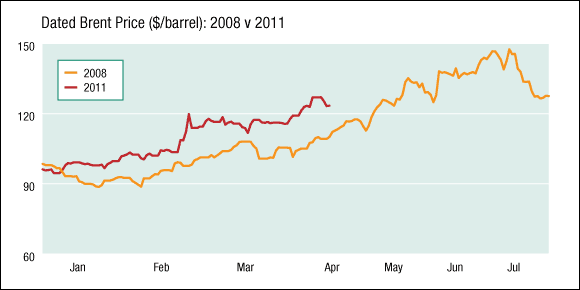OPEC fails to cover plunge in Libyan output in March
By Margaret McQuaile in London
April 15, 2011 - OPEC president Iran pledged at the beginning of March that the oil producer group stood ready to boost output if the political unrest in Libya were to lead to a supply shortage.
Latest estimates show, however, that although some key members have increased crude production, the volumes have not been enough to cover the entire drop in Libyan supply, with the result that OPEC output has fallen substantially between February and March.
On March 8, Ali Naimi, oil minister of OPEC powerhouse Saudi Arabia, said rising crude prices were "not related to supply and demand fundamentals in oil markets as much as they are related to speculation by funds and the negative and unrealistic view on supplies." (See related price chart: Dated Brent Price ($/barrel): 2008 v 2011).
A month later, on April 10, Naimi reiterated the view that the oil price climb to 32-month highs was due primarily to speculative activity and unjustified fears about the future of supply and demand. He said oil markets were balanced and oil inventories stable.
Platts estimates show that Saudi Arabia boosted output to around 9 million b/d last month, a level indicated by the Saudi oil minister himself in his March 8 remarks, from 8.7 million b/d in February and 8.4 million b/d in January.
Other smaller increases have come from the kingdom's Gulf neighbours Kuwait and the UAE.
But the latest Platts survey of OPEC and oil industry officials and analysts shows overall OPEC output falling by 630,000 b/d to 29.17 million b/d, the volume of increases proving insufficient to cover the 930,000 b/d dive in Libyan output to 460,000 b/d.
Other independent estimates also show big falls in OPEC output between February and March.
The International Energy Agency reckons OPEC supply plunged by 890,000 b/d to 29.2 million b/d in March, while the US Energy Information Administration estimates March output at 28.72 million b/d, down 1.27 million b/d from February.
Despite the substantial month-on-month drop in OPEC output, the likelihood that the market will see only limited volumes of Libyan oil (from eastern areas controlled by the rebel National Transitional Council and marketed by Qatar) over the next few months, and the strong crude prices, OPEC has continued to rule out a meeting before its next conference on June 8 in Vienna.
To subscribe or visit go to: http://www.platts.com
![]()
